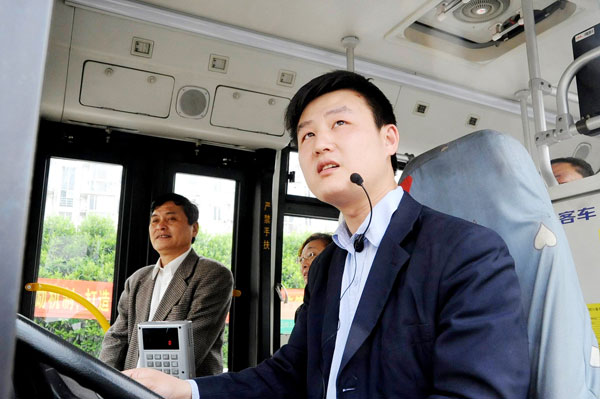Save the word
Updated: 2013-06-12 02:25
By Wu Ni (China Daily)
|
||||||||
 |
|
Some bus drivers have been using the Shanghai dialect as a working language since 2011. Provided to China Daily |
The Modern Baby Kindergarten in Shanghai's Pudong New District gives classes in Mandarin, but uses the Shanghai dialect in other activities and class conversations, said Zhu Jianmin, director of the kindergarten.
Every Friday of the week is "dialect day" when teachers and children only speak the local dialect. The kindergarten also organizes regular trips to the city's historical sites, teaching about them in the Shanghai dialect. Nursery rhyme-singing contests in the local dialect are often held, according to Zhu.
"Children in our kindergarten master the local dialect well, but if primary and middle schools don't offer an environment in which it is spoken, it is possible that they may forget it," she said.
Cao Yanmei, a mother from Suqian in Jiangsu province who has settled her family in Shanghai, sent her 3-year-old son to a kindergarten in Zhabei district in September. She is happy to see that he has learned to sing some nursery rhymes in the Shanghai dialect.
"The teachers are Shanghai natives and they speak the local dialect during games and daily conversations," she said.
"Since my son will live in Shanghai, his mastery of the dialect will help him communicate with the local community and blend in better with society. Moreover, it shows respect to the local culture".
Qian Nairong, director of the Research Center of Linguistics at Shanghai University, said that the loss of a local dialect's popularity with the younger generation means a loss of culture.
"The most vivid words and lively expressions are all born from the local dialect, which is the source of cultural creativity. Protecting the dialect is a key to maintaining cultural diversity," he said.
Qian, who has studied the Shanghai dialect for nearly 50 years, said that most of the city's post-1990 generation has lost the ability to speak in the local tongue.
A report released by Shanghai Academy of Social Sciences last year showed that only 60 percent of Shanghai native students can fully understand their local dialect and only half of them speak it at home.
There are 129 languages in China and 117 are endangered, according to the book China's Languages published by the Chinese Academy of Social Sciences in 2008.
Li Lan, a linguist in dialect studies with the CASS, said most of the endangered dialects are spoken by ethnic groups. But the nine non-Mandarin dialects still have hundreds of millions of speakers. The Wu dialect, for example, has around 70 million speakers in Shanghai, Zhejiang and Jiangsu.
Talk local
The Shanghai dialect has been introduced to more of the city's public places in an effort to preserve the fast-fading local mother tongue.
One of the latest is the Shanghai dialect guide service introduced on May 19, National Tourism Day, by the centuries-old Guyi Garden in Nanxiang town, Jiading district.
The garden invited Shanghai dialect experts to record the information for its audio guide. Tourists can borrow the audio devices for free or talk to a virtual guide on WeChat, a popular mobile communication platform, by scanning a QR, or quick respond code, at about 20 locations within the garden. The practice will be copied by other sightseeing spots in Shanghai in the future.
The dialect is also expected to be broadcast in more public transportation. Since the end of May, departure announcements for two China Eastern flights have been issued in the Shanghai dialect at Pudong airport.
Passengers flying on MU701 from Shanghai to Hong Kong and on MU2512 from Shanghai to Wuhan, Hubei province, will hear the local dialect broadcast to remind them of boarding times, apart from the Putonghua and English announcement.
In early 2012, Shanghai Airlines started broadcasting the city information in the Shanghai dialect on selected flights and is planning to cover all flights landing in the city by the end of this year.
Seven local bus lines have used the Shanghai dialect for announcements since it was first used on buses of Route 785 in December 2011.
In May last year, Shanghai Ren-ai Hospital started to offer a Shanghai dialect service, apart from Mandarin and English services.
Hospital officials said they can better serve senior patients who can only speak the local dialect. Patients can speak to doctors and nurses at the reception desk and out-patient clinics in the Shanghai dialect. And nurses can interpret for doctors who don't speak the Shanghai dialect.
Qian Cheng, deputy director of the Shanghai Comic Troupe, is advocating for more presence of the dialect in local media. He is doing three radio shows in the Shanghai dialect through the Shanghai Media Group.
In June last year, the long-running TV program News Workshop started a Shanghai dialect version, becoming the first TV news program to be broadcast in the Shanghai dialect.

 Michelle lays roses at site along Berlin Wall
Michelle lays roses at site along Berlin Wall
 Historic space lecture in Tiangong-1 commences
Historic space lecture in Tiangong-1 commences
 'Sopranos' Star James Gandolfini dead at 51
'Sopranos' Star James Gandolfini dead at 51
 UN: Number of refugees hits 18-year high
UN: Number of refugees hits 18-year high
 Slide: Jet exercises from aircraft carrier
Slide: Jet exercises from aircraft carrier
 Talks establish fishery hotline
Talks establish fishery hotline
 Foreign buyers eye Chinese drones
Foreign buyers eye Chinese drones
 UN chief hails China's peacekeepers
UN chief hails China's peacekeepers
Most Viewed
Editor's Picks

|

|

|

|

|

|
Today's Top News
Shenzhou X astronaut gives lecture today
US told to reassess duties on Chinese paper
Chinese seek greater share of satellite market
Russia rejects Obama's nuke cut proposal
US immigration bill sees Senate breakthrough
Brazilian cities revoke fare hikes
Moody's warns on China's local govt debt
Air quality in major cities drops in May
US Weekly

|

|







